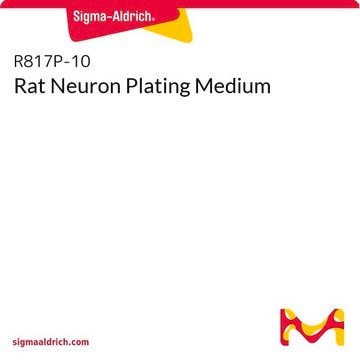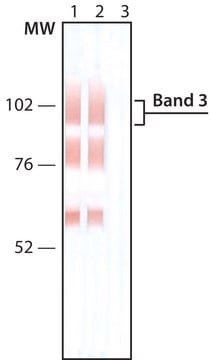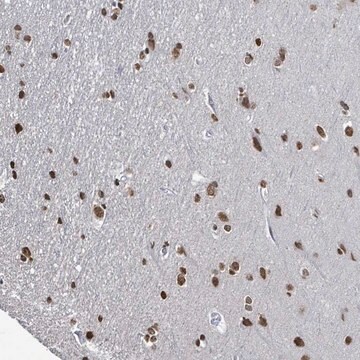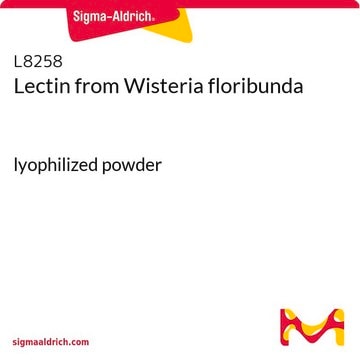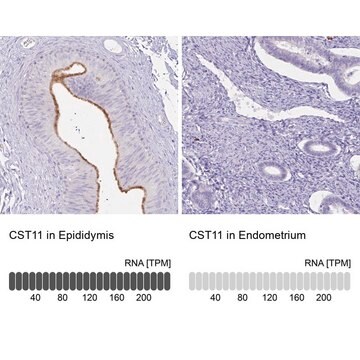General description
HNRNPU (heterogeneous nuclear ribonucleoprotein U) is the largest protein of the HNRNP proteins, which are one of the most abundant eukaryotic nuclear protein families. HNRNPU is an abundant nucleoplasmic phosphoprotein. It has a molecular weight of 120kDa, and is composed of 806 amino acids. It contains an acidic region of amino acids succeeded by a glutamine-rich region in its N-terminal, and its C-terminal is rich in glycine, asparagine and arginine. Its RNA-binding region lies in the 112 amino acid glycine-rich stretch in the C-terminal. It is a nuclear matrix protein, and is composed of a SAF-Box, an AT-rich chromosomal region (scaffold- or matrix-attachment region (S/MAR))-binding domain, SPRY (Spla and Ryanodine receptor) domain of unknown function, and RGG (arginine-glycine-glycine) RNA-binding domain. All these three domains are conserved.
Monoclonal Anti-hnRNP-U (mouse IgG1 isotype) is derived from the 3G6 hybridoma produced by the fusion of mouse myeloma cells (Sp2/0 cells) and splenocytes from mice BALB/c immunized with RNP′s eluted from an oligo-dT cellulose column.
Immunogen
RNP′s eluted from an oligo-dT cellulose column.
Application
Anti-hnRNP-U antibody, Mouse monoclonal has been used in immunoblotting, immunoprecipitation, immunofluorescence, immunohistochemistry and immunocytochemistry.
Monoclonal Anti-hnRNP-U antibody produced in mouse has been used for WB, IHC, flow cytometry and IP.
Biochem/physiol Actions
HNRNPU (heterogeneous nuclear ribonucleoprotein U) interacts with pre-mRNA in vivo and with both RNA and ssDNA in vitro. This protein participates in various pathways, including transcriptional regulation, telomere length control and X inactivation. It is thought to be involved in the high order organization of the nucleus, as it is capable of binding both RNA and DNA. A hypomorphic mutation of HNRNPU in mice results in early embryonic death, indicating its essential role in cell viability. It participates in various events of RNA metabolism, such as, RNA transport on a viral system, regulation of RNA stability by its binding to the 3′UTR (untranslated region) of TNFα (tumor necrosis factor), and telomere length control.
Heterogeneous nuclear ribonucleoproteins (hnRNPs) act in several biological activities such as transcription, pre- mRNA processing, cytoplasmic mRNA translation and turnover. In the nuclei of cells infected with Vesicular Stomatitis Virus (VSV), hnRNP-U associates with the virus leader RNA, colocalizes with the virus in the cytoplasm and also is found packaged within the purified virions.
Target description
hnRNP-U belongs to the subfamily of ubiquitously expressed heterogeneous nuclear ribonucleoproteins (hnRNPs). The hnRNPs are RNA binding proteins and they form complexes with heterogeneous nuclear RNA (hnRNA). These proteins are associated with pre-mRNAs
Physical form
Solution in 0.01 M phosphate buffered saline, pH 7.4, and 15 mM sodium azide.
Disclaimer
Unless otherwise stated in our catalog or other company documentation accompanying the product(s), our products are intended for research use only and are not to be used for any other purpose, which includes but is not limited to, unauthorized commercial uses, in vitro diagnostic uses, ex vivo or in vivo therapeutic uses or any type of consumption or application to humans or animals.
